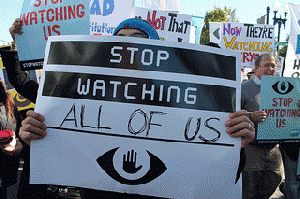President
Obama's Friday speech on NSA surveillance was a calculated endeavor to calm a
furor at home and abroad over the US dragnet surveillance. However, the
proposed changes do not provide any fundamental changes in the intelligence
gathering activities.
The president called for an end to the
government's current storage of "metadata," information about many millions of
calls made by ordinary Americans. He emphasized that the capacity to search
metadata is one that must be preserved, but without government itself holding
it. The president directed the U.S. attorney general and the intelligence
community to report on the best way to transfer the metadata out of government
hands, before the program comes up for reauthorization on March 28. He said during
this transition period, the government shouldn't have access to metadata
without judicial approval.
The
president endorsed the proposal to appoint a public advocate to represent
privacy and civil liberties interests before the Foreign Intelligence
Surveillance Court.
The president called for more transparency with respect to National Security letters, which allow the Federal Bureau of Investigation, without court approval, to obtain access to people's records (such as their bank and credit card information).
In his 43 minutes speech President Obama aggressively defended the NSA surveillance programs as important tools to combat terrorism.
The New York Times pointed out that President Obama made no mention of two of the recommendations of his panel of most pressing concern to Silicon Valley: that the N.S.A. not undermine commercial s oftware and that it move away from exploiting flaws in software to conduct cyber attacks or surveillance.
Brian Fung writing in the Washington Post argued that President Obama's reforms are narrowly targeted at the NSA's phone metadata program under Section 215 of the Patriot Act. "They don't cover other programs the government carries out under Section 215, such as the reported scraping of financial information by the CIA. They don't address the NSA's counter-encryption activities or any geolocation information that the NSA may have or may be collecting. They also don't address other programs like those conducted under Section 702 of the FISA Amendments Act, which is the authority under which PRISM operates. Some of the reforms, both on the telephony metadata surveillance and others that the President is announcing today, require an act of Congress, and given the Senate's general support for the NSA throughout the controversy, it's unclear how much traction these proposals will get. Much of the spying that happens internationally will also remain untouched."
Washington Post reported that President Obama avoided almost entirely any discussion of overseas intelligence collection that he authorized on his own, under Executive Order 12333, without legislative or judicial supervision. The Washington Post has disclosed in recent months, based in part on the Snowden documents, that the NSA is gathering hundreds of millions of e-mail address books, breaking into private networks that link the overseas data centers of Google and Yahoo, and building a database of trillions of location records transmitted by cell phones around the world. Unless Obama says otherwise in the classified annex to his directive, those programs will carry on unabated.
The Electronic Frontier Foundation scorecard
The Electronic Frontier Foundation (EFF) put together a scorecard showing how President Obama's announcements stack up against 12 common sense fixes that should be a minimum for reforming NSA surveillance. On that scale, President Obama racked up 3.5 points out of a possible 12. Here are the scoreboard points:
1. Stop mass surveillance of digital communications and communication records. Score: 0.2
2. Protect the privacy rights of foreigners. Score: 0.3
3. No data retention mandate. Score: 0
4. Ban no-review National Security Letters. Score: 0.5
5. Stop undermining Internet security. Score: 0
(Note: You can view every article as one long page if you sign up as an Advocate Member, or higher).






